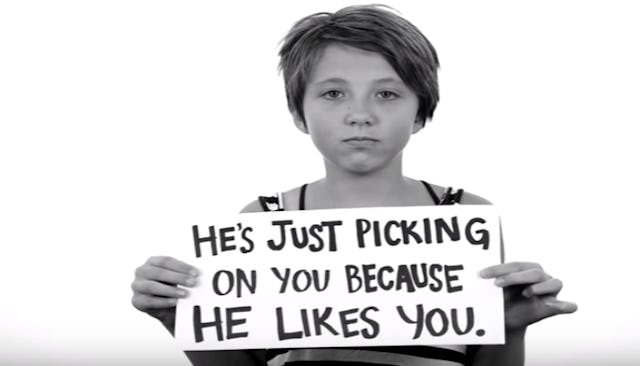Video Shows How We Expose Our Kids To Rape Culture Without Even Realizing It

“It’s On Us” campaign releases video about rape culture
Think saying things like He’s just picking on you because he likes you and man up aren’t that big of a deal? Think again. No one is being ‘too sensitive.’ No one is blowing anything out of proportion. We’re talking about sexual assault here – frankly if we’re not making a big deal out it than we’re failing our kids horribly. Our sons and daughters are growing up in a deeply disturbing sexual landscape and sometimes what we say is part of the problem.
It’s those common phrases and sayings we’ve been hearing all of our lives, that are damaging to our kids’ lives. The latest It’s On Us video produced by the Ad Council and the SheKnows Hatch program shows us exactly how off-handed remarks and so-called harmless jokes play a role in perpetuating rape culture and victim-blaming.
Boys will be boys
How much did you drink?
Well, what were you wearing that night?
She was “asking for it”
Were you flirting with him?
The 90-second video highlights things we say that encourage boys to be these hyper-masculine beings while blaming girls for everything boys do. Which, as we’ve seen, extends into cases of sexual assault and rape. This is ass backwards and total bullshit. It’s unacceptable.
Maybe you’re a parent that’s trying to discern what is media hype in recent headlines and what is real. Maybe you think because you’re raising boys this doesn’t concern you. Maybe you just don’t know what to think. Let us break it down for you. Every 109 seconds, an American is sexually assaulted, according to Rape Abuse And Incest Network (RAIIN). Every eight minutes, that victim is a child. Only six out of every 1,000 perpetrators will end up in prison. This is not OK. Our girls and boys are not OK.
Twenty-year old Brock Turner was accused of raping an unconscious young woman behind a dumpster. He was found guilty of three felony counts of sexual assault, and only spent three months in jail. Adding disgusting insult to injury Turner’s own father minimized the assault by calling it “20 minutes of action” and implored us all to care about his son missing out on beloved steak dinners. It was emphasized that the survivor in the case had been drinking. In what world is this acceptable? First off, calling sexual assault and rape an”action” totally minimizes what happened. And second, nothing justifies assault and rape. Not drinking, not dressing a certain way, not having tons of sex with tons of partners. Literally, none of it.
Rape culture is prevalent. It is rampant. We perpetuate it by saying things that blame the victim and accuse them of lying. We let rape culture continue by letting perpetrators get off way easier than they should and not holding them accountable for their crimes. This is outrageous. But we can stop the cycle.
We can take a step back and honestly examine what we’re saying and teaching our kids. We can mindfully figure out if how we speak at home is accidentally perpetuating this cycle of sexual violence. We can observe and admit silent compliance. Many of us have probably laughed uncomfortably at a deeply concerning joke, or brushed off a totally inappropriate remark in regards to sex or sexual assault, either not realizing it or to save face and not create a confrontation in social environments. In my corporate jobs I let so many comments slide all because I didn’t want to disturb the peace, come off as “too sensitive” or give my employer a reason to fire me. But now that we’re all aware we have a responsibility to not let it continue.
We can break the cycle by teaching consent to our kids. Your body, your boundaries. No one is owed sex. No one is entitled to sex. If you’re feeling forced or coerced into doing something sexual that you don’t want to do, that is sexual assault. Period. Full stop.
Let’s be part of the solution to end sexual violence. This is how we start- with conversations among ourselves and with our kids. Our words have weight. Taking responsibility for what we say and how we act are the first steps.